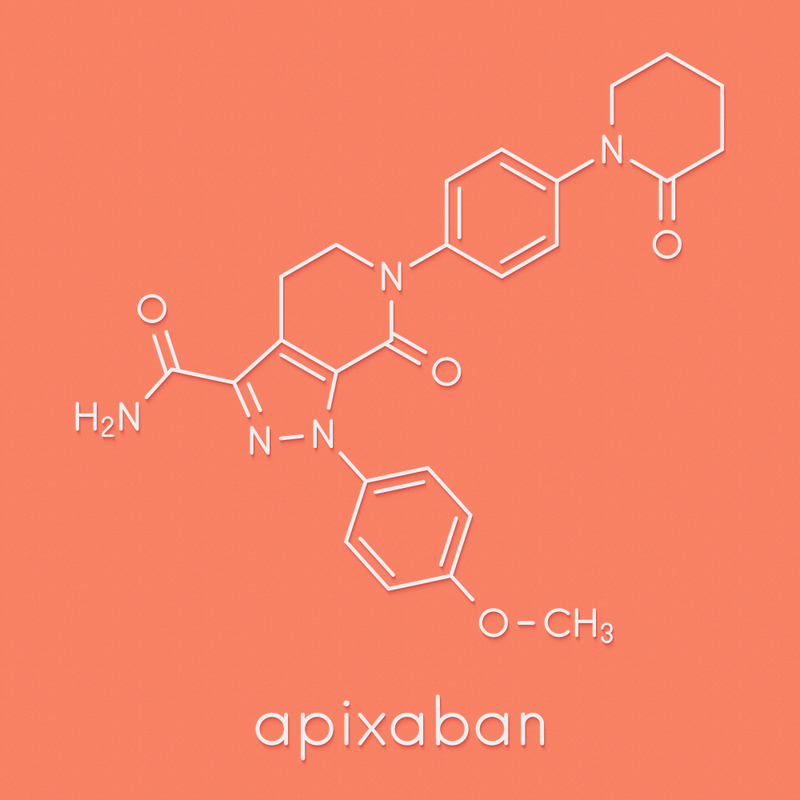Apixaban safer than warfarin in patients with ESKD
M3 Global Newsdesk Sep 01, 2018
In patients with dialysis-dependent end-stage kidney disease (ESKD) and atrial fibrillation (AF), apixaban is a safer choice than warfarin to prevent stroke, according to a retrospective cohort study.

The study was conducted among Medicare beneficiaries. In addition, the study also found that patients on the standard dosage of apixaban (5 mg twice daily) had lower rates of stroke and death compared with those on a 2.5-mg twice daily dosage.
No difference in the risk of stroke or systemic embolism was found between apixaban and warfarin but the risk of major bleeding was reduced by about one-fourth in apixaban recipients, found Konstantinos C. Siontis, MD, Mayo Clinic, Rochester, MN, and colleagues. The investigators also found that use of direct oral anticoagulants such as apixaban increased during the time data were analyzed (October 2010 to December 2015).
“This study is the first investigation of the potential safety and effectiveness of apixaban in ESKD patients on dialysis,” they wrote in Circulation. “In our main analysis comprising any apixaban dose, apixaban users had almost 30% reduced risk of major bleeding as compared with a matched cohort of warfarin-treated patients.”
The reduction in major bleeding events with apixaban relative to warfarin is consistent with that found in the ARISTOTLE trial of non-ESKD patients with AF, they noted. ARISOTLE found a 31% relative reduction in bleeding risk with apixaban versus warfarin, with the relative risk reduction with apixaban even greater among patients with low estimated glomerular filtration rate.
The authors noted that the safety of apixaban may be greater in patients with more advanced kidney dysfunction, and therefore, safer in patients spanning a broader range of kidney function. This may be due to the fact that apixaban is not renally eliminated.
“In conclusion, apixaban is increasingly utilized among patients with ESKD on dialysis and AF in the United States and now accounts for more than a quarter of new anticoagulant prescriptions in this population. Apixaban may be associated with superior safety and effectiveness outcomes in this population as compared with warfarin.
While both the standard and reduced apixaban doses were associated with lower major bleeding risks compared with warfarin, only the standard 5 mg dose was associated with reduced thromboembolic events and mortality. These findings require further investigation and confirmation in randomized controlled trials,” concluded Dr. Siontis and colleagues.
Using the United States Renal Data System, researchers identified 25,523 Medicare patients with ESKD on dialysis and with AF (mean age: 68.2 years; 45.7% women) who were prescribed an oral anticoagulant. Over the 5 years of the study, prescriptions for apixaban increased, and by 2015, comprised 26.6% of new anticoagulation prescriptions.
Researchers focused their analysis on the 2,351 patients who were prescribed apixaban and the 23,172 prescribed warfarin. About two-thirds of patients in each group discontinued anticoagulation within 12 months after their initial prescription.
The rate of stroke/systemic embolism was 12.4 per 100 patient-years for the apixaban group and 11.8 per 100 patient-years for the warfarin group, a nonsignificant difference (HR: 0.88; P=0.29). The event rates for major bleeding were 19.7 and 22.9 per 100 patient-years for the apixaban and warfarin groups, respectively (HR: 0.72 favoring apixaban; P < 0.001). The rates of intracranial bleeding were not significantly different between apixaban and warfarin (3.1 vs 3.5 per 100 patient-years, respectively).
Apixaban was associated with a nonsignificant trend towards reduced mortality risk (HR: 0.85; P=0.06).
In the apixaban group, 44% were prescribed the standard dose (5 mg twice daily) and 56% were prescribed a reduced dose of 2.5 mg twice daily.
- In matched cohorts of apixaban 5 mg twice daily and warfarin, apixaban was associated with statistically significantly lower risks of incident stroke/systemic embolism (HR: 0.64; P=0.04), major bleeding (HR: 0.71; P=0.02), and death (HR: 0.63; P=0.003).
- In matched cohorts of apixaban 2.5 mg twice daily and warfarin, apixaban was associated with a lower risk of major bleeding (HR: 0.71; P=0.007) but the risks of stroke/systemic embolism (HR: 1.11; P=0.49) or death (HR: 1.07; P=0.52) were not significantly different.
Upon multivariable Cox regression analyses, researchers found that the standard dose of apixaban was associated with lower risks of stroke/systemic embolism (HR: 0.61; P=0.04) and death (HR: 0.64; P=0.01) compared with the reduced dose. The findings “suggest that ESKD alone is not a sufficient indication for dose reduction of apixaban,” they wrote.
Whether or not anticoagulation reduces stroke risk in dialysis patients with AF was not addressed in this study, they emphasized, adding that even though apixaban was associated with a reduction in the risk of bleeding compared with warfarin, the intracranial bleeding rate with apixaban was still 3.1 per 100 patient-years, which is “strikingly high in comparison to the rate of 0.33 per 100 patient-years in ARISTOTLE.”
This study was performed while Dr. Siontis was at the University of Michigan Cardiovascular Center in Ann Arbor.
This story is contributed by Wayne Kuznar and is a part of our Global Content Initiative, where we feature selected stories from our Global network which we believe would be most useful and informative to our doctor members.
-
Exclusive Write-ups & Webinars by KOLs
-
Daily Quiz by specialty
-
Paid Market Research Surveys
-
Case discussions, News & Journals' summaries